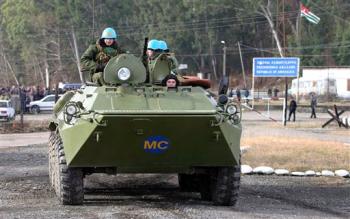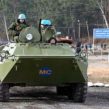
INTERNATIONAL ORGANIZATIONS PASSIVE AS RUSSIA MOVES TROOPS INTO ABKHAZIA
Publication: Eurasia Daily Monitor Volume: 5 Issue: 86
By:

According to United Nations Under Secretary General for Peacekeeping Operations Jean-Marie Guehenno, the UN currently has 110,000 peacekeepers in 20 missions worldwide and is set to increase the number to 130,000. That is almost twice the number of NATO troops involved in expeditionary operations. The UN’s peacekeeping strength has greatly increased since 2000. Peacekeeping Operations has become the UN’s single largest department. Interviewed against the backdrop of Russian of “peacekeeping” as a means of aggression in Georgia, however, Guehenno stops shy of even mentioning that inconvenient situation. He is to be succeeded in July by another French diplomat (Le Figaro, May 3).
Focusing on humanitarian peacekeeping on three continents, the UN has failed to use any of its vast resources for peacekeeping in post-Soviet conflicts. There, it allows Russian and proxy forces a free hand. Following the Russian “peacekeeping” interventions in the 1990s, Moscow sought UN consent to a special responsibility for Russia as peacekeeper in the “CIS space.” The UN never consented to this, but tolerated and eventually accepted a Russian peacekeeping monopoly there. In the case of Georgia’s Abkhazia region, UN tolerance developed into de facto political collaboration with a Russian operation that flouts all UN standards of peacekeeping (see EDM, May 5).
The United Nations Secretary General’s Group of Friends of Georgia failed for the first time in memory to display a common front publicly, following the downing of an unmanned Georgian aerial vehicle by a Russian plane on April 20. The group’s Western members–the United States, Britain, France, and Germany–issued a statement separately from the group’s other member, Russia, during the UN Security Council’s April 25 emergency session on the incident. The Western powers’ statement stopped far short, however, of calling for reforming Russia’s “peacekeeping” operation. Instead, it merely called for an increase in the powers of the United Nations Observer Mission in Georgia (UNOMIG); and urged Georgia and Abkhazia to support the initiative (press release, April 25).
UNOMIG with its 133 unarmed military observers is in no sense a peacekeeping operation. Rather, it is a passive bystander to Russia’s now 3,000-strong, heavily armed “peacekeeping” contingent. The proposed increase in UNOMIG’s capacity depends on the consent of veto-wielding Russia. Consequently, Russia’s UN envoy Vitaly Churkin curtly dismissed the Western friends’ initiative: “They themselves understand that this is something that is not going to happen” (Reuters, April 25). UN spokesperson Marie Okabe acknowledged on May 1, the third day of the Russian deployment of additional troops, that the Russian side had not informed UNOMIG about the troop numbers, their locations, and their armaments (UN press release, May 1).
Some of the top Western leaders seem to be poorly briefed or unfocused with regard to the legal and operational aspects of Russian “peacekeeping.” U.S. Secretary of State Condoleezza Rice and the European Union’s High Representative for the Common Foreign and Security Policy, Javier Solana, for example, have apparently taken at face value Russia’s claim that it was entitled to deploy additional “peacekeeping” troops to Georgia’s Abkhazia region on April 29. Russian Minister of Foreign Affairs Sergei Lavrov told Rice and Solana that the Russian troop increase was within the number authorized by earlier agreements governing that operation (Interfax, April 29; U.S. State Department press release, May 1). By this, Moscow means two sets of agreements signed in 1994 by Russia, Georgia, and the Commonwealth of Independent States (CIS). Those, however, are de facto arrangements without legal value on either the bilateral or international level. Moreover, the additional deployment without Georgian consent violates international law.
Following a meeting with Lavrov on EU-Russia relations, Solana told a news conference ambiguously, “Even if the increase in peacekeepers is within limits, if we want to diminish the perception of tension I don’t think it is a wise measure to increase now” (EU Observer, Reuters, April 30).
Thus, Moscow’s basic premise found acceptance in that quarter. Furthermore, Solana’s statement downgraded real and dangerous tension as a mere perception and questioned only the timing, not the essence, of Russia’s move. In a somewhat similar vein, the EU’s Slovene Presidency voiced misplaced confidence that the situation would be resolved “in a tolerant and diplomatic manner. After yesterday’s talks [with Lavrov], I believe that this will happen,” Slovenia’s Minister of Foreign Affairs Dmitrij Rupel predicted” (Reuters, April 30). In reality, the supplementary Russian troops were streaming into Georgia’s Abkhazia region that day.
For her part, Rice told journalists, “What the Russians are doing is part of a peacekeeping operation that they’re involved in. … The fact is, as I understand it, it’s still within certain limits permitted by the peacekeeping arrangements there” (State Department press release, May 1). This and similar statements by Western officials implicitly accept de facto “peacekeeping” arrangements as valid, despite the lack of legal standing. They also seem to imply without realizing it that those arrangements can be allowed to trump international law.
In a more clearly focused statement, NATO spokesman James Appathurai noted that the Russian troop deployment lacked Georgian consent and undermined stability (press release, April 30). NATO has desisted since 2003, however, from seeking a peacekeeping role in the post-Soviet conflicts.




